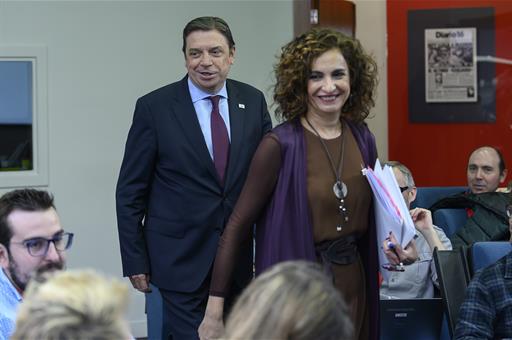Council of Ministers
Government raises minimum wage to 950 euros with retroactive effects from 1 January
Council of Ministers - 2020.2.4
Moncloa Palace, Madrid
The Council of Ministers approved the rise in the minimum wage to 950 euros in 14 payments. This amount has been set taking into account economic factors and competitiveness, among other elements.
The Minister for the Treasury and Government Spokesperson, María Jesús Montero, highlighted that this measure is the result of dialogue with the social stakeholders, whom she thanked for their will to forge an agreement. In this regard, she expressed her interest in talks continuing with a view to repealing the most harmful aspects of the labour reform and of drawing up a new Workers' Statute to tackle such challenges as digitalisation, work/life balance and the incorporation of women in labour activities.
María Jesús Montero highlighted that more than 2 million people will directly benefit from the initiative, and hence it is not just another policy, but "a policy that goes to the very heart, to the core of households", and contributes to improving the citizens' lives.
Coronavirus Coordination Committee
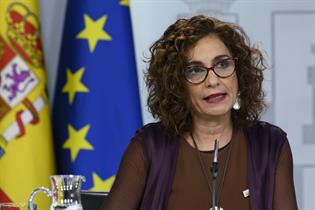 Pool Moncloa/Borja Puig de la BellacasaThe government agreed to set up an Inter-ministerial Coordination Committee given the threat of the coronavirus to public health. This work group will monitor and assess the situation and coordinate the government's cross-cutting response to any occurrence. In parallel, the Evaluation and Monitoring Committee of the Ministry of Health will continue to meet on a daily basis.
Pool Moncloa/Borja Puig de la BellacasaThe government agreed to set up an Inter-ministerial Coordination Committee given the threat of the coronavirus to public health. This work group will monitor and assess the situation and coordinate the government's cross-cutting response to any occurrence. In parallel, the Evaluation and Monitoring Committee of the Ministry of Health will continue to meet on a daily basis.
María Jesús Montero asserted that Spain has a modern, efficient, effective, universal and free National Health System that is ready to tackle the situation. "Citizens can rest assured that wherever they may live and whatever their income may be, the public system will take care of them and prevent an outbreak of this disease".
The Government Spokesperson called for people to avoid unfounded alarmism, condemned any sign of xenophobia and called for restraint, responsibility and co-existence. "The Chinese community lives in our country with absolute normality; it is perfectly integrated with our customs and way of understanding life".
The minister reported that the only case that has tested positive in Spain is that of the German patient in hospital on La Gomera, who remains asymptomatic. Those people who were in contact with him are also asymptomatic, although they remain isolated and under surveillance. The Spaniards repatriated from Wuhan remain in quarantine at Gómez Ulla Hospital, and do not present any symptoms either.
First measures from Agricultural Negotiating Table
The Council of Ministers analysed the report on the recently created Agricultural Negotiating Table formed by the government and professional farming organisations (ASAJA, COAG and UPA), which held its first meeting on Tuesday.
The Minister for Agriculture, Fisheries and Food, Luis Planas, explained that the initiative responds to the need to take measure in a coordinated fashion to guarantee the future of Spanish farming and livestock breeding given such problems as price volatility and lower business margins, and announced that dialogue will also be extended to other players in the agri-food sector, such as industry, distribution companies and consumers", who take the final purchasing decision".
This forum has defined several areas of action coordinated between the government and the primary sector, including agricultural insurers to address this. The minister pointed out that the draft National Budget for 2020 will increase the allocation of public funds to facilitate this key tool to be contracted for producers in the event of the loss of production due to adverse climate conditions.
The second measure proposed is the amendment of the law on the agri-food chain, which dates back to 2013, so that it includes a more precise list of banned trade practices, the regulation against the destruction of the value of agricultural products over the course of the chain (loss from scrapping), an obligation on the inclusion of the production cost as a reference factor in establishing the prices of agricultural contracts, and the publication of sanctions imposed on companies that breach the rules in contracts with farmers and breeders.
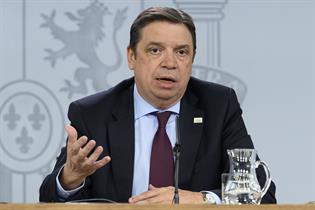 Pool Moncloa/Borja Puig de la BellacasaLuis Planas also announced the drafting of a detailed reported on the situation of the olive oil and fruit sector by the Food Chain Observatory, and the holding of a meeting next week of the Olive Oil Board to examine promotional measures with a view to stepping up sales to third countries.
Pool Moncloa/Borja Puig de la BellacasaLuis Planas also announced the drafting of a detailed reported on the situation of the olive oil and fruit sector by the Food Chain Observatory, and the holding of a meeting next week of the Olive Oil Board to examine promotional measures with a view to stepping up sales to third countries.
The minister also explained that a dialogue process has now begun "which had not been undertaken to date", with large distribution companies in Spain, a fundamental element within the chain from producers to end consumers, and from both an economic and a reputational perspective.
Another of the goals set is to better structure, both vertically and horizontally, the offer of agri-food goods through inter-branches, which allows producers, agricultural organisations and industry to unite in structuring a specific productive sector.
The minister also plans to meet soon with the fruit and vegetable sector to analyse necessary actions, particularly on issues of competition with third countries.
Government support for farming and livestock breeding sector
Luis Planas argued that "without farmers and livestock breeders and without the rural environment, Spain would not be as it is" and we need them "to have a future". The minister acknowledged that the claims made by the sector, which has been holding demonstrations since last week, are "fair" and he expressed his full "support, respect and understanding" with them on behalf of the government.
According to the figures provided by the minister, there are close to 800,000 agricultural producers and livestock breeders in our country, which constitute 4% of people in work. Spain is the fourth large agri-food producer in the European Union and the eighth largest exporter of agri-food products in the world, generating more than 100 billion euros annually.
However, continued Luis Planas, the reality is complex, with a high level of modern productivity and holdings, and small-holders whose way of life does not exclusively depend on agriculture, which he defined as "the vast middle class of Spanish agriculture and livestock breeding, which is the group experiencing tough times that we must support".
Home straight for approval of CAP
The minister defined the European Council on 20 February as decisive for deciding on the European Budget and the portion thereof allocated to the Common Agricultural Policy (CAP). "Spain's allocation is a red line".
Luis Planas argued that the application made of the CAP must benefit family and professional farmers and the middle classes in the rural environment, who are the key to the Spanish agri-food sector. Luis Planas asserted that "whoever obtains sufficient return and profits from the market does not need the support of the CAP because that is not its raison d'etre".
Transposition of EU directives
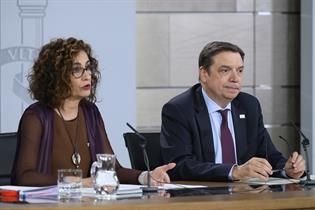 Pool Moncloa/Borja Puig de la BellacasaThe Council of Ministers approved a Royal Decree-Law on urgent measures to include several European Union directives that must be transposed to Spanish law.
Pool Moncloa/Borja Puig de la BellacasaThe Council of Ministers approved a Royal Decree-Law on urgent measures to include several European Union directives that must be transposed to Spanish law.
The Government Spokesperson specified that these directives affect the contracting of the so-called excluded sectors, certain sectors of water, energy, transport and the postal services, with the aim of pushing through more efficient and transparent contracts with fewer administrative burdens.
Other EU directives will also be transposed on the distribution of insurance relating to the supervision of pension funds from employment, as well as on tax modifications and tax litigation.
The law introduces greater harmonisation and improves the EU regulation of VAT, which has no effects on collection, but rather simplifies so-called intra-Community operations. María Jesús Montero explained that the intermediaries of these operations will have criteria and systems for standardised information throughout the European Union in order to pass on and deduct VAT without differentiating according to the specific rate applied in each country.
Tax agreement regarding Gibraltar
The government agreed to pass through Parliament the agreement on taxation and the protection of financial interests between Spain and the United Kingdom in relation to Gibraltar, following Brexit.
The Government Spokesperson claimed that until 31 December 2020 a process will take place for a negotiated withdrawal, but should no agreement be reached then Spain would be ready with the decision adopted on Tuesday, which takes into account the agreement reached between the Governments of Gibraltar and Spain.
In her opinion, the agreement is a very useful tool in the fight against tax fraud in Gibraltar, is an important instrument in defending Spain's interests and avoiding the use of companies that are fiscal residents in Spain from employing the tax regime in Gibraltar.
Other agreements
The government has fast-tracked the management of transport subsidies for goods to or from the Balearic Islands in order to offset the competitive disadvantage that may exist because of its island status regarding the market in terms of additional service costs.
It also authorised the maintenance of the Madrid-Levante high-speed railway line to be put out to tender for the sum of 63.56 million euros to guarantee the optimum state of railway lines and reduce incidents.
Current affairs
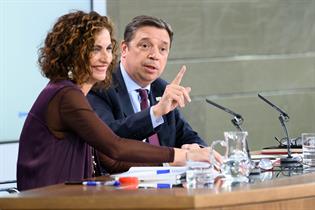 Pool Moncloa/Borja Puig de la BellacasaThe Government Spokesperson announced that the Fiscal and Financial Policy Council will meet on Friday to set out and share with regional governments the new path of stability and thus undertake the work necessary to present the draft National Budget in the Lower House of Parliament.
Pool Moncloa/Borja Puig de la BellacasaThe Government Spokesperson announced that the Fiscal and Financial Policy Council will meet on Friday to set out and share with regional governments the new path of stability and thus undertake the work necessary to present the draft National Budget in the Lower House of Parliament.
As regards the meeting to be held between the President of the Government, Pedro Sánchez, and the President of the Regional Government of Catalonia, Joaquim Torra, on Thursday, María Jesús Montero declared that the government wishes to convey its unequivocal vocation for dialogue as a solution to political conflict. "We need to talk, to listen and to attend the meeting with a frank vocation for finding meeting points", and "we must be creative, collaborative and show empathy with the situation in Catalonia", she said.
As regards the unemployment figures published on Tuesday, the Government Spokesperson stressed that the highest ever number of National Insurance contributors in a month of January was posted and that Spain is growing by more than the Eurozone average, although we must step up this rate, to which end it is essential to approve the National Budget.
The Government Spokesperson referred to the official event to open the 14th Legislature held this week, and the formalisation of the commencement of activity at full speed" in the Upper and Lower Houses of Parliament. "We want, hope and will work for politics serve a purpose, as our citizens are demanding".
María Jesús Montero recalled, on the World Cancer Day, those people who suffer from and are fighting this disease, of which 270,000 new cases are detected in Spain each year. The Government Spokesperson conveyed a message of "hope and affection" to them, and praised the medical professionals and researchers that are working towards finding a solution.
Non official translation





